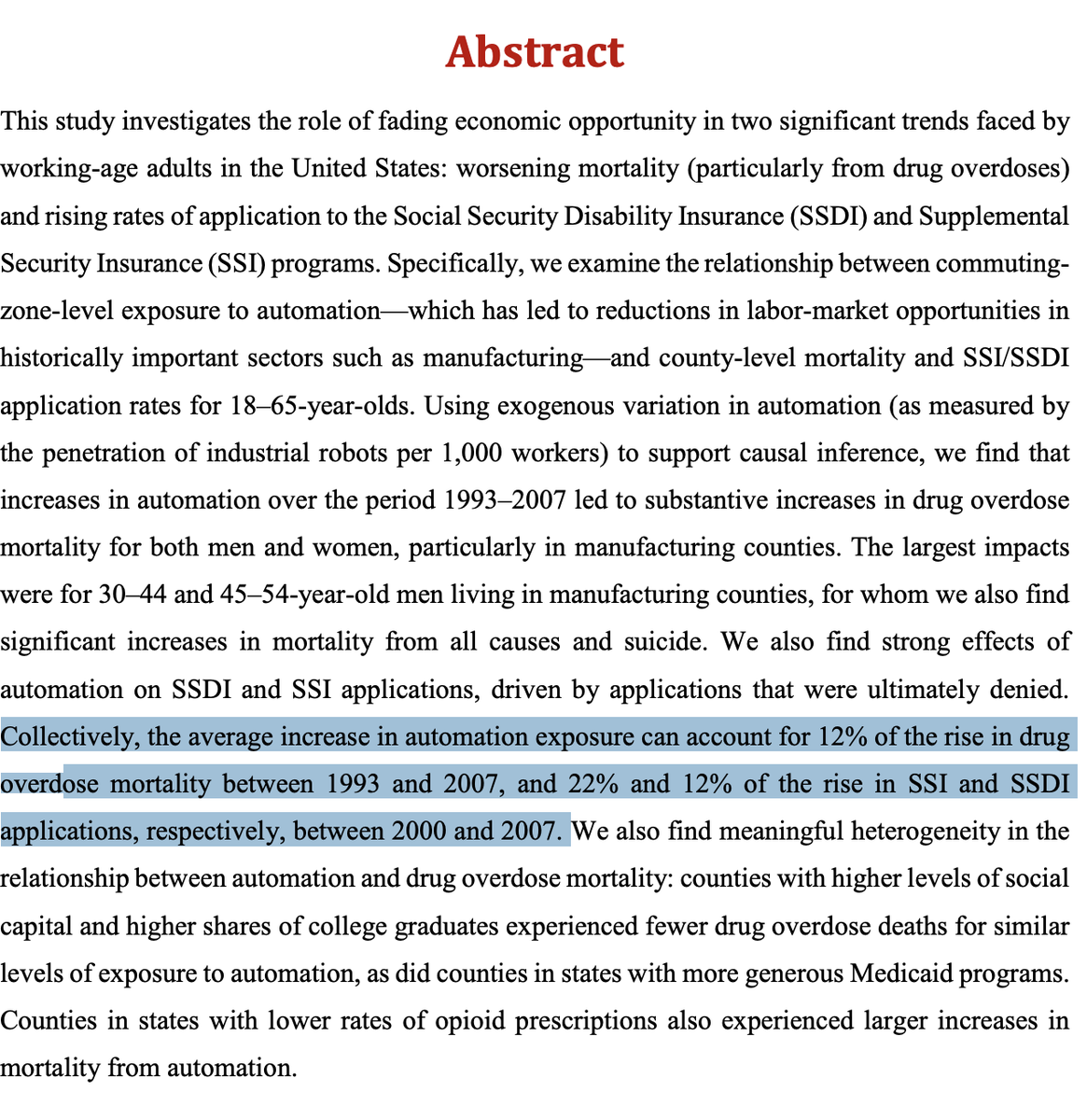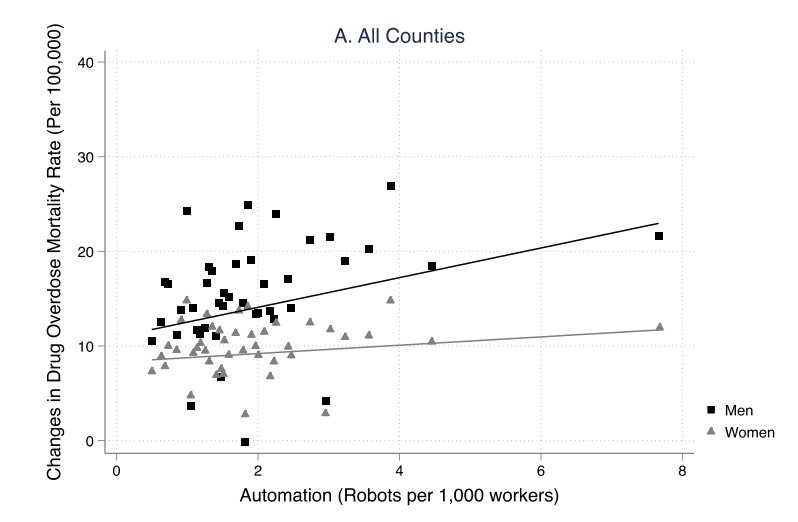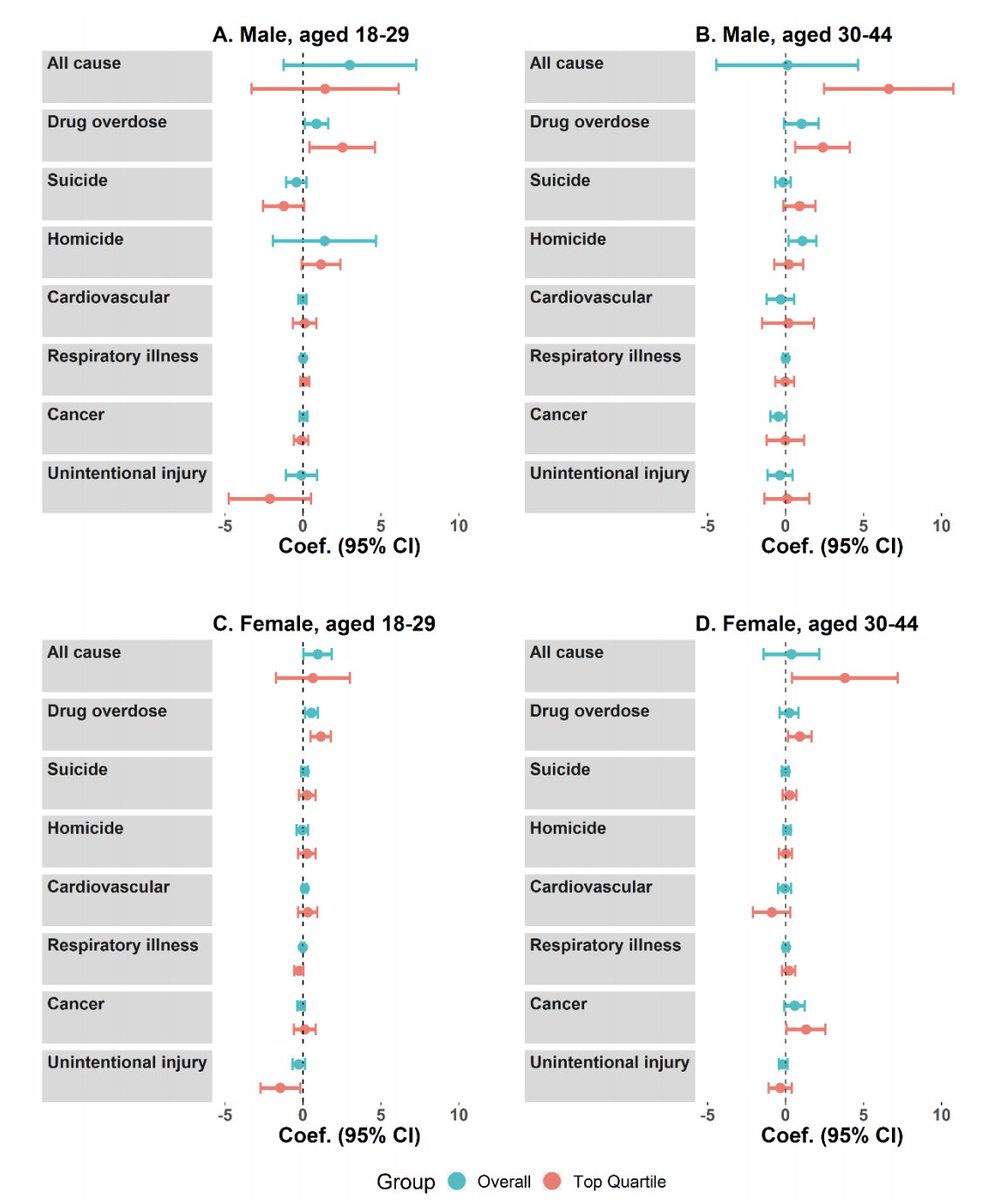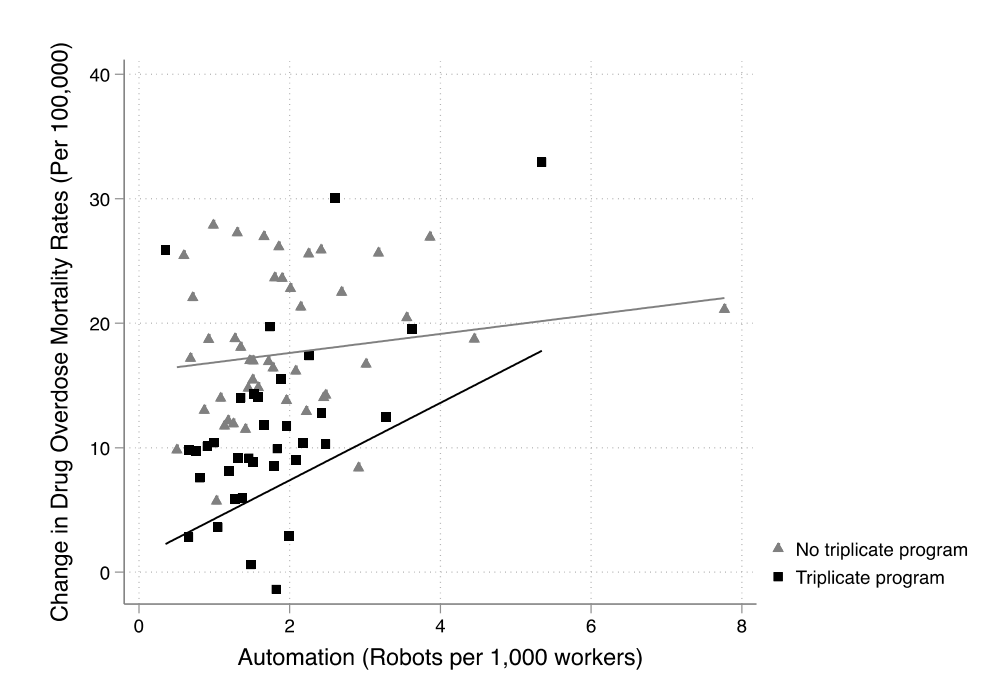 New @UWMadisonCFS working paper from our @OppforHealthLab team (Lizzie Bair, @RourkeOBrien, me) on the impacts of labor market #automation on #disability insurance applications and #mortality among working age adults.
New @UWMadisonCFS working paper from our @OppforHealthLab team (Lizzie Bair, @RourkeOBrien, me) on the impacts of labor market #automation on #disability insurance applications and #mortality among working age adults.https://cfsrdrc.wisc.edu/project/wi20-08
2/ Basic premise: fading economic opportunities in manufacturing have been associated with worsening mortality among #workingclass adults: https://opportunityforhealth.org/topics/changing-economy/
Automation has played an imp role in declining job opportunities in this sector.
Has it harmed population health?
Automation has played an imp role in declining job opportunities in this sector.
Has it harmed population health?
3/ We use newly available data on labor market automation + county-level, age-cause specific mortality and SSDI/SI applications and determinations to answer this question.
Our exogenous measure of automation comes from Acemoglu+Restrepo's recent work: https://www.journals.uchicago.edu/doi/full/10.1086/705716
Our exogenous measure of automation comes from Acemoglu+Restrepo's recent work: https://www.journals.uchicago.edu/doi/full/10.1086/705716
4/ We focused primarily on drug overdose mortality, and find that exogenous changes in the adoption of industrial robots led to substantive increase in drug overdose mortality, particularly for men. This figure captures the main results:
5/ We also looked at mortality for a variety of different causes, finding interesting, nuanced patterns by age-sex-cause. Here's just one example: we increases in ALL cause mortality among early middle aged men and women, centered primarily in manufacturing counties.
6/ We then turned to disability applications, which other work has shown to increase after economic opportunity fades (e.g, https://opportunityforhealth.org/topic/changing-economy/economy-and-disability-labor-market-conditions-and-the-disability-of-working-age-individuals/) and may portend rising mortality.
We find that automation --> increased SSI and SSDI applications, driven *fully* by denied apps.
We find that automation --> increased SSI and SSDI applications, driven *fully* by denied apps.
7/ BUT - does automation always have to lead to death?
We looked at whether prevailing policy generosity and social capital moderate these effects.
We find, for mortality, that a better safety net+ social capital does blunt neg. effects of automation. This gives us hope!
We looked at whether prevailing policy generosity and social capital moderate these effects.
We find, for mortality, that a better safety net+ social capital does blunt neg. effects of automation. This gives us hope!
8/ Given most of our findings are driven by rising drug overdose deaths, we also tried to understand how supply (opioids) and demand side (automation) work together to produce negative outcomes.
9/ Using the "triplicate state" approach of Alpert and @thedavidpowell, we find in states where opioid marketing was lower, there was an overall lower increase in drug deaths in the study period - but these were MUCH more sensitive to automation: https://www.nber.org/papers/w26500 .
10/ Hard to know what to make of this. One interpretation is that supply side factors washed out any potential demand side influence - but that removing supply may unmask demand driven growth in opioid deaths. We don't push that very far of course. Just an interesting finding.
11/ At the end of the day:
"the average increase in automation exposure can account for 12% of the rise in drug overdose mortality between 1993 and 2007, and 22% and 12% of the rise in SSI and SSDI applications, respectively, between 2000 and 2007"
"the average increase in automation exposure can account for 12% of the rise in drug overdose mortality between 1993 and 2007, and 22% and 12% of the rise in SSI and SSDI applications, respectively, between 2000 and 2007"
12/ We conclude that (1) automation was an important driver of rising disability and mortality, though there were of course many other important drivers, too, (2) there is scope for public policy to make these links far from being destiny.
13/ Our findings relate to a large literature. I want to first mention @Osea82's paper on automation, which posted in Sept. This neat paper focuses on worker health, but also looks at overall drug + suicide mortality (finding similar effects as us): http://ftp.iza.org/dp13672.pdf
14/ They also relate to a whole line of work on deindustrialization and the health of younger and older workers, summarized in @OppforHealthLab thread (written by @drdrtsai) here: https://twitter.com/OppforHealthLab/status/1334135867733106689
15/ They are consistent with a growing literature on disability programs applications/receipt, specifically neat published and ongoing work by @NicoleMaestas2 @JCMecon @TisaSherry and many others
16/ And they also relate to new work on the importance of state policy in shaping population health trends in the US, e.g., this great recent paper by @jennkarasmontez @mdhayward and team: https://onlinelibrary.wiley.com/doi/full/10.1111/1468-0009.12469%0A
17/ We have many more projects on this intersection of topics and are actively revising *this* paper for submission soon.
We appreciate @UWMadisonCFS for supporting this study and are curious for your comments.
Thanks for your interest!
Fin/
We appreciate @UWMadisonCFS for supporting this study and are curious for your comments.
Thanks for your interest!
Fin/

 Read on Twitter
Read on Twitter





